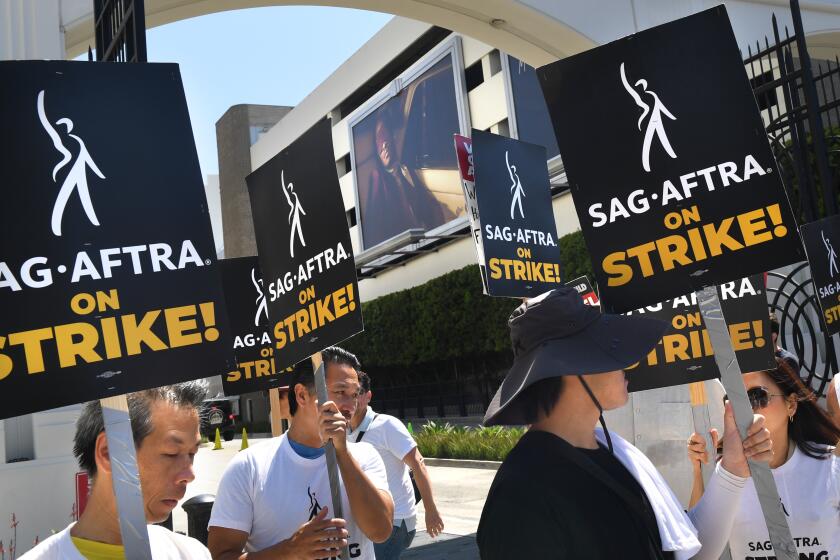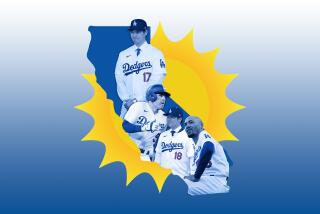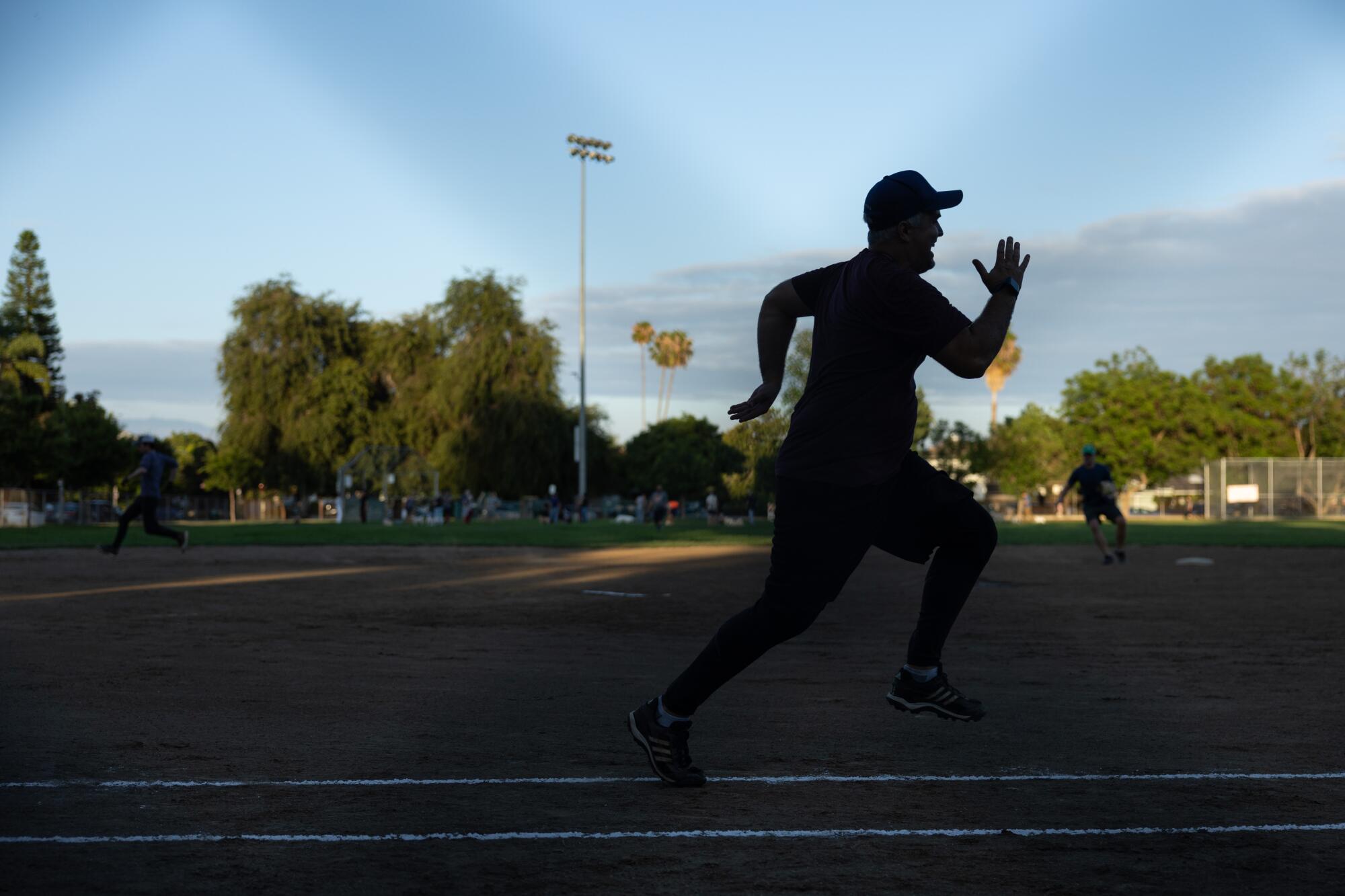
The softball game between Keyser’s Angels and the Studio City Stutzmans on Thursday seemed like any other adult-rec league matchup, at first.
Easily caught balls ... weren’t. Mighty swings produced pop-ups or dribblers. No one hit towering shots to the outfield — a good thing, since a large group of dog owners looked on from right field.
The most visible hint of something else going on was a slogan that many players bore on their outfits:
Strike.
Many Angels played in T-shirts with the word cascading down the front in different colors. Some Stutzmans wore Writers Guild of America strike hats and removed “Strike Captain” pins they had worn on the picket line hours before.
Then there were the team names. Keyser is WGA West negotiating committee co-chair and former President Chris Keyser. Stutzman is chief negotiator Ellen Stutzman.
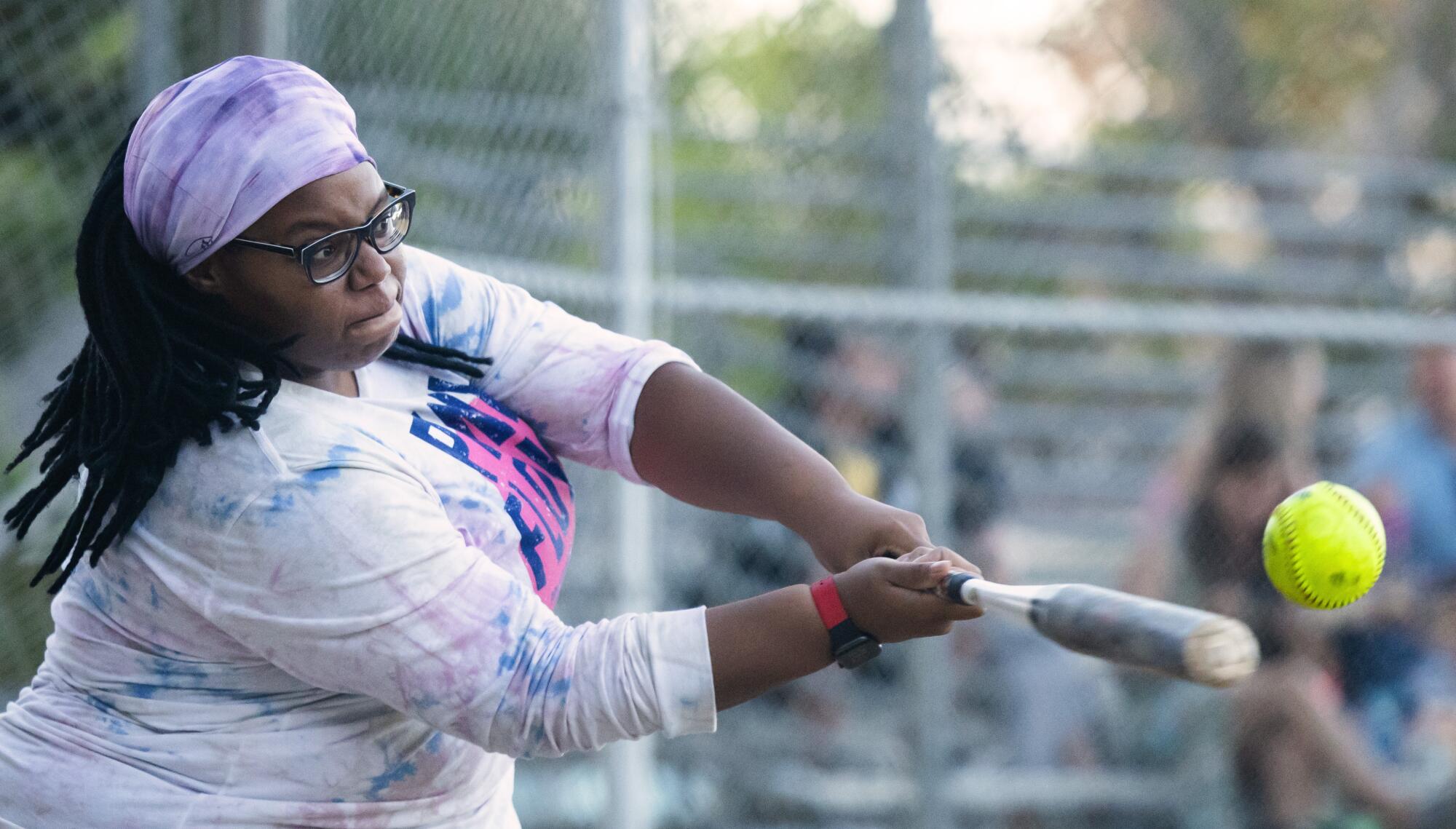
The six teams in the WGA Strike Softball League began play the first week of July — about two months into the writers’ strike and about two weeks before the SAG-AFTRA strike — and will go through September.
Although sanctioned by the union, the league isn’t limited to members. It includes actors, showrunners, stunt people, industry newcomers and anyone else who wants to let out their frustrations against Hollywood’s labor impasse with games that are equal parts “The Bad News Bears” and “Norma Rae.”
“It’s a way to have everyone come together and give ourselves an hourlong break from worrying about covering bills,” said Stutzmans captain Andrew Aroche, a WGA West diversity and inclusion coordinator. His wife, a member of the IATSE entertainment industry union who’s out of work because of the strike, cheered from the stands with their Chihuahua-terrier mix, Oreo.
“Most people are coming in from the picket line, and no matter that we’re exhausted, we show up,” Aroche said. “Players want to experience this.”
IATSE member and Angels player Steph Cheng told me she joined the league because it “has the right spirit” for members to cope with the moment. No one was trying to one-up one another, as in the typical writers room. There was no trash-talking, no groaning at errors. Instead, shouts of “Good eye” and “Good contact” and “Next time” filled the air.
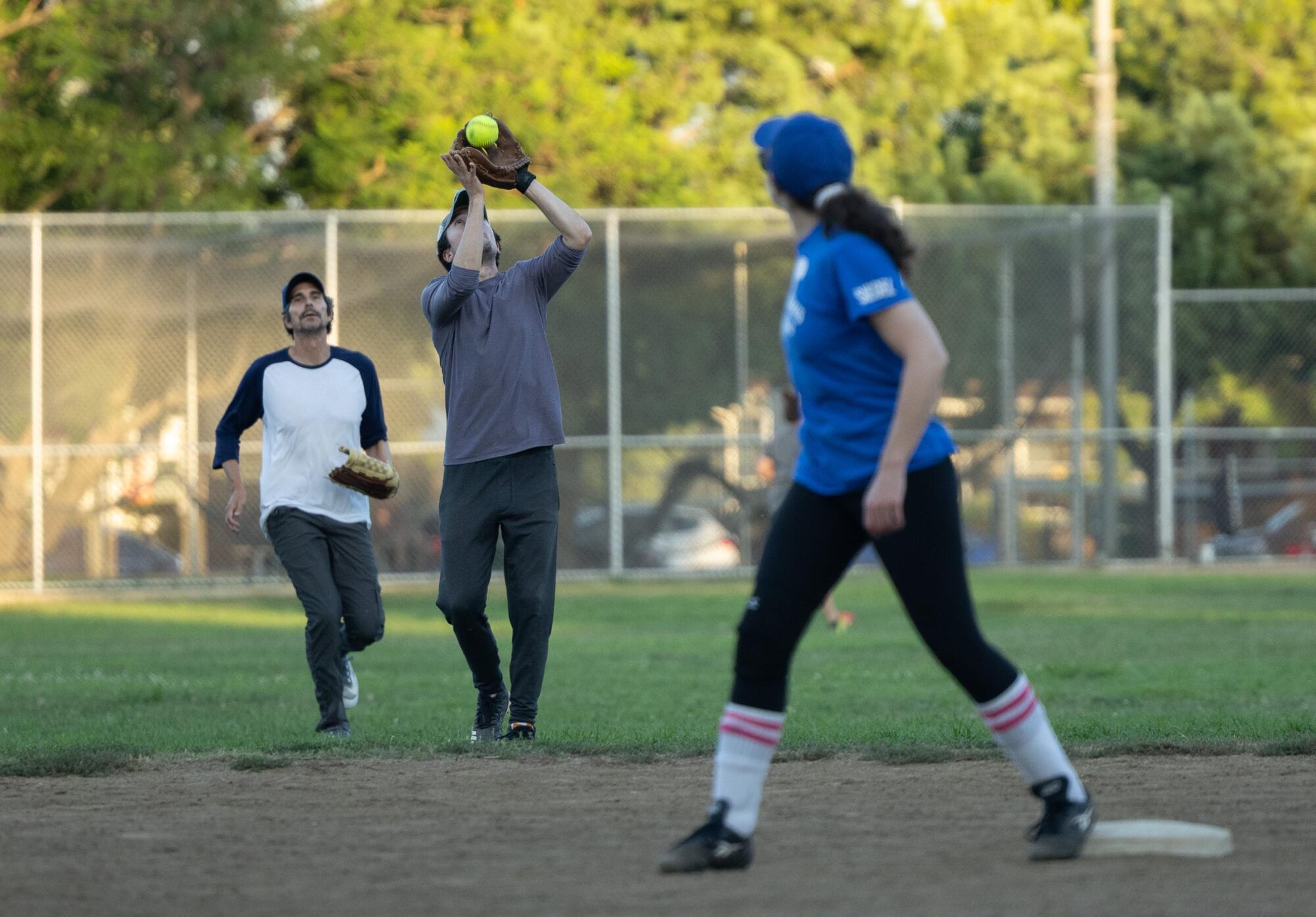
But as the game went on, the cheers got louder, the swings got stronger, the high-fives more passionate. The competition was real.
During one play, Stutzmans player and WGA member Charles Morris ran with such ferocity to beat a throw at home plate that he grabbed on to the backstop rail, lest he crash through the chain link fence.
“That’s the highlight,” Morris yelled as he came back to the dugout, “of the last 101 days.”
Benji Kaufman, a 30-year-old Simi Valley resident and SAG-AFTRA member, created the league after missing a cocktail mixer and the social contact that came with it. He figured softball was an easy way to commiserate with his fellow strikers. After all, studios, networks, talent agencies and television shows have assembled leagues for decades, with games played across Los Angeles, including here at the Studio City Recreation Center.
But those leagues are for people with jobs and have historically been male-dominated. Kaufman wanted to open space for nonunion folks who are trying to break into Hollywood and have faithfully observed and even participated in the WGA and SAG-AFTRA picket lines.
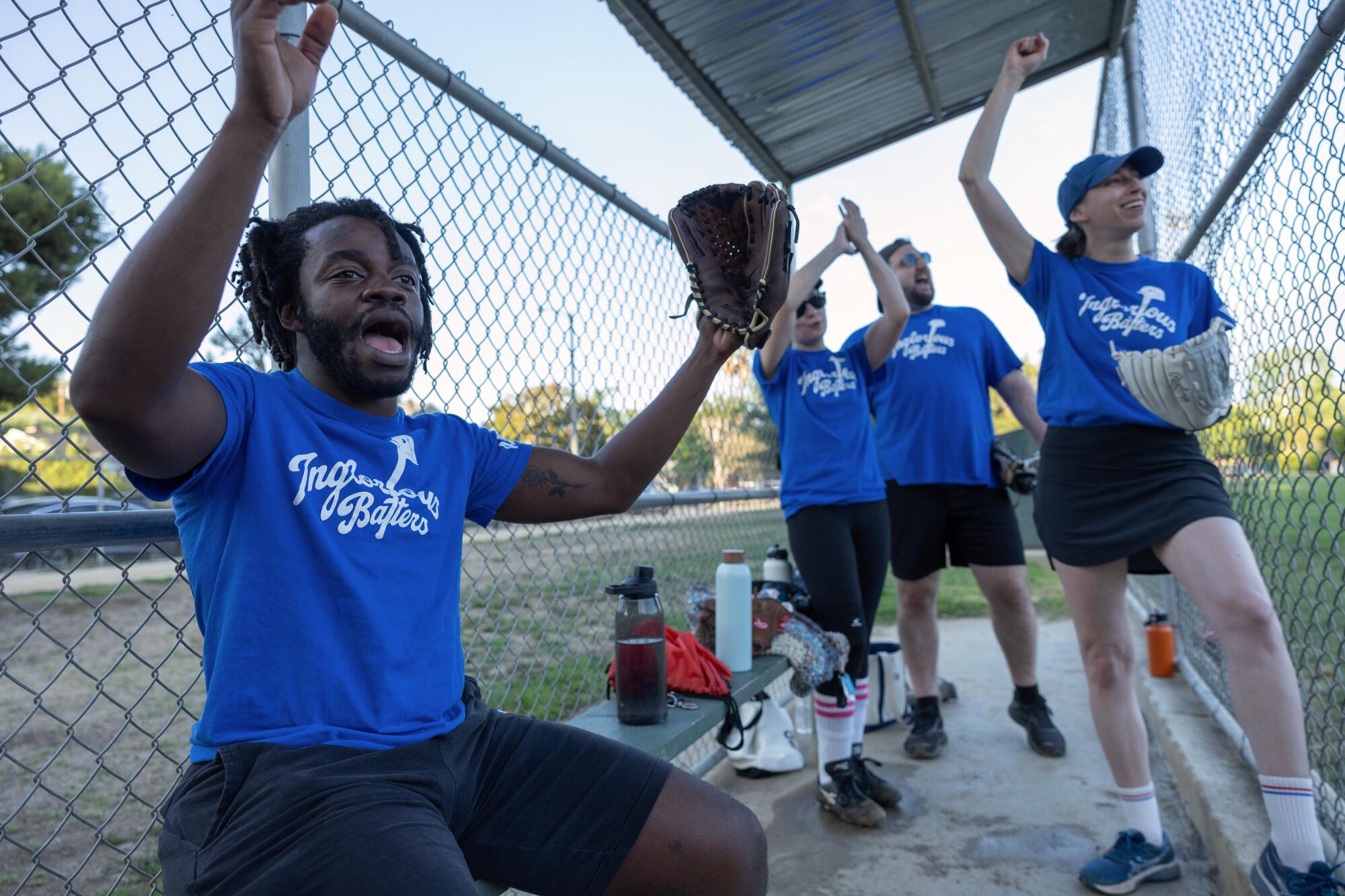
“Camaraderie events are important right now,” Kaufman, whose team is the Inglorious Batters, told me as a Department of Recreation and Parks worker chalked the baseball diamond and set the bases. “This is a bunch of people going through something together, and the solidarity is beautiful.”
As commissioner, Kaufman assigned each team a color and $425 in league dues to cover city fees that included the use of two fields and an umpire. Each squad features 12 players and must play at least four women each game. There’s an ever-growing wait list, now at 36, of people ready to sub at an email’s notice for the three games that happen every Thursday evening.
The Batters had the first slot the day I went, against the Purple Team, so named because their assigned color was, well, purple. But half an hour before the game, Kaufman and I, along with the Rec and Parks worker, were the only ones there.
“A lot of people are out of town for vacations,” Kaufman said apologetically. Soon after, Glassell Park resident Laura Monti showed up with her boyfriend, Danny Ryan. The two had just found out about the league through the WGA’s weekly email.
“I haven’t been at bat in a while,” admitted Monti, a WGA member who wrote for a Marvel Studios series that will debut next year. Ryan, an aspiring writer, last played organized ball in eighth grade.
“Don’t worry,” Kaufman told them with a smile. “That’s how we all were on Week One.”
The mention of a star’s big hit, a producer’s new-found clout or a writer’s wild pitch doesn’t necessarily mean Hollywood heavy hitters are discussing the latest industry buzz.
Soon after, more players began to show up and stretch to a soundtrack of Rage Against the Machine, Green Day and System of a Down. The Inglorious Batters wore blue T-shirts with their logo in the front and ironed-on numbers and last names on the back. The Purple Team wore outfits in their namesake tone.
“The names aren’t very funny or clever at all,” said Isaac Gonzalez, a WGA member in the league who was out of town but had chatted with me earlier. “You don’t get funny names if you’re not going to get paid.”
“It’s time!” yelled the umpire — the same Rec and Parks guy who chalked the diamond and refused to tell me his name.
“Do not, do not, do not throw the bat,” he told Kaufman and the Purple Team captain, David Sidorov, loud enough so both sides could hear. “First time, that’s a warning. Second time, you’re out.”
In less than five minutes, the Purple Team was up 4-0 through well-placed hits and bobbles by the Batters.
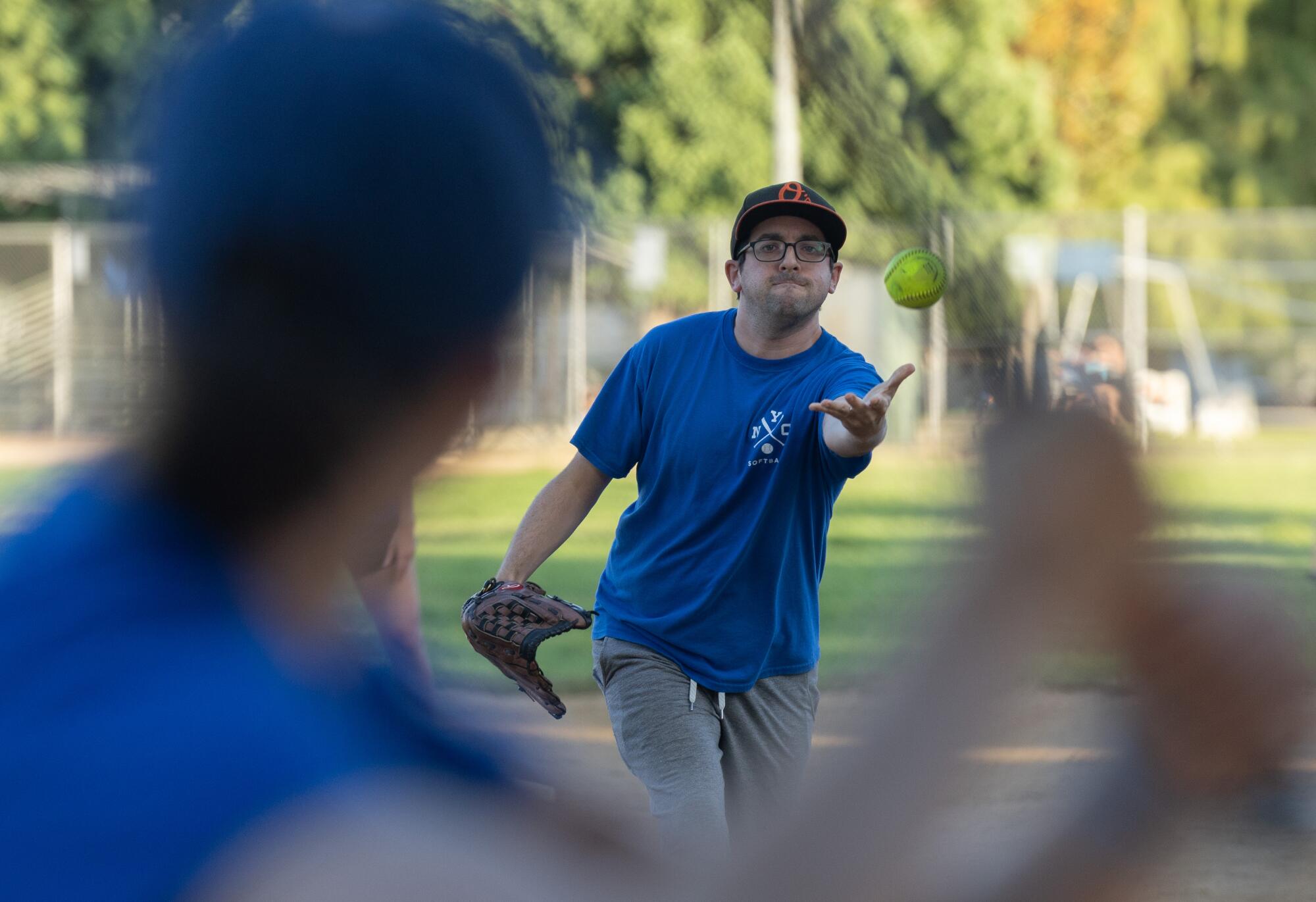
Kaufman wasn’t fazed. “Let’s rally, let’s rally!” he yelled as the Batters went up to, well, bat.
The stands began to fill with supporters of both teams. Matthew Brandon sat on the grass with his friends. Signs on their laps featured words of encouragement and photos of Matthew’s brother, Purple Team first baseman Thomas Brandon.
“They’re bonding together so wonderfully with these games,” Matthew said. “It’s a good way for them to relax for a bit.”
I bounced back and forth between that game and the Angels versus Stutzmans, which the latter team won 9-4. It was great to see the players, all going through a historic yet scary time in their careers, remind themselves by hustling and bumbling together that strikers deserve a couple of hours of unabashed fun.
To paraphrase a quote commonly attributed to legendary labor activist Emma Goldman: No one should want to be part of a revolution that doesn’t let them play.
With writers and actors on strike, the studios have a full-blown labor revolt on their hands — and they have no one but themselves to blame.
I returned to the Inglorious Batters and the Purple Team for their final inning. The Batters had staged a furious comeback. They were now ahead 15-9.
Members of the Goldfish, another strike jeague team scheduled to play at 8:30, looked on. They wore button-up jerseys and hats with a “old, drunk, tired fish,” joked emelle, a SAG-AFTRA member who goes by one lowercase name.
She was there with teammates Betzi Marroquin, Veve Melendrez and Lorinda Hawkins Smith. The four had appeared in a play this summer about homelessness in Los Angeles.
“This is like another community we’re creating,” Marroquin said.
“It’s not like we’re doing anything else right now,” Melendrez responded with a sigh.
The Batters and the Purple Team lined up to congratulate each other. Then, the Batters celebrated near the pitcher’s mound. “This was our biggest game of adversity coming back,” Kaufman told his players. “This was a total team effort.”
There were two more games to go before the playoffs. The Batters were now in third place. There’s already interest in a fall league, Kaufman said — hopefully, with everyone back at their jobs, working under a fair contract.
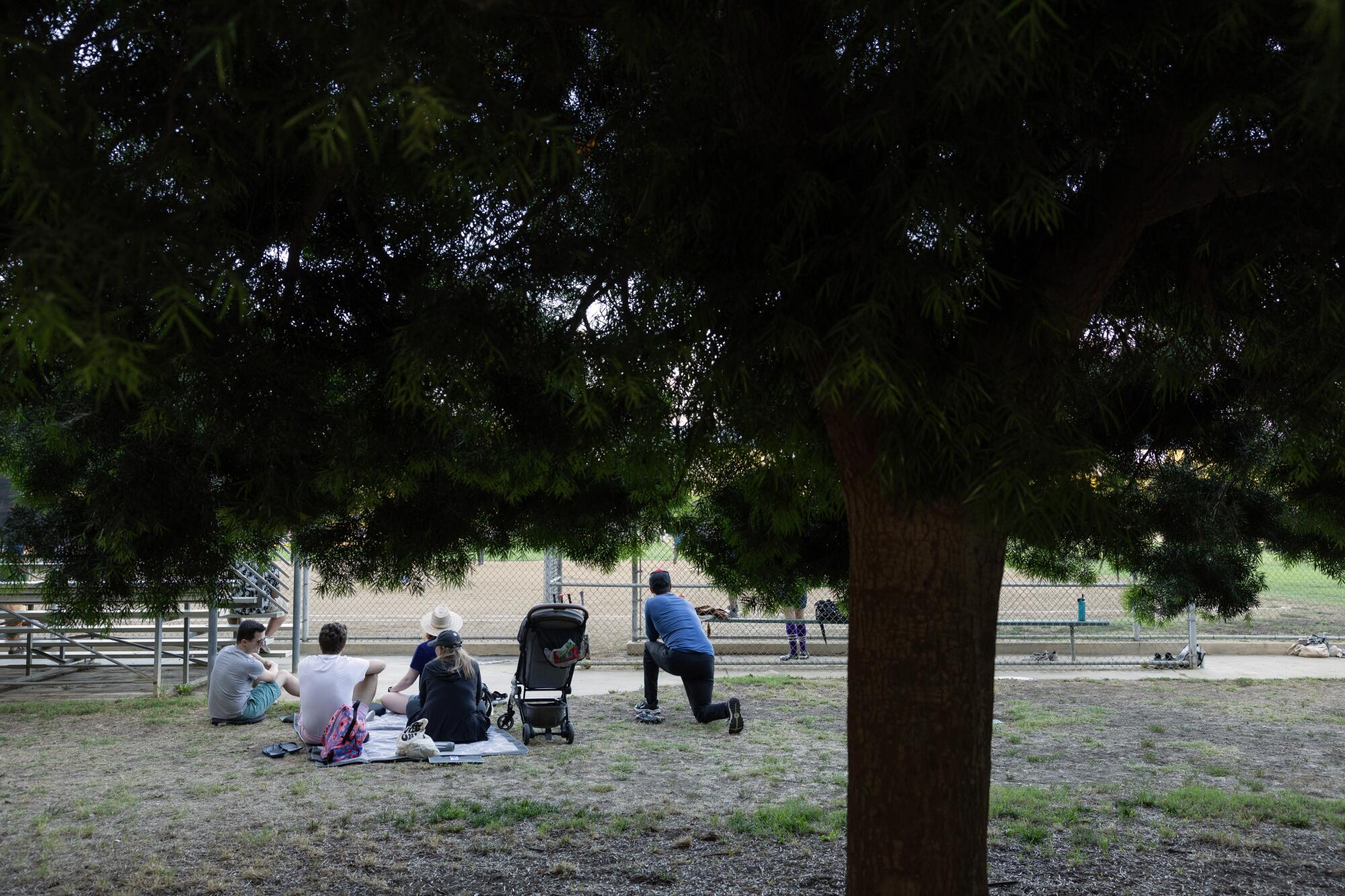
“I wasn’t sure if it was going to be my cup of tea, but this is great!” exclaimed Rachel Alter, a strike captain at Paramount who wore a pink baseball cap that read, “In My Strike Era.” She had walked four times and scored four runs. “The picket lines are some of the first times people have met at work post-COVID, so to play with each other lets writers bond even more.”
Everyone clapped as Kaufman handed the game ball to Alex Blagg. The writer and comedian took one more swing.
“Sometimes when you’re up against long odds and powerful producers,” Blagg said to cheers, “you just have to trust your team.”
More to Read
Sign up for Essential California
The most important California stories and recommendations in your inbox every morning.
You may occasionally receive promotional content from the Los Angeles Times.
